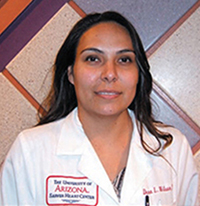 Why did you choose your specific health professional career?
Why did you choose your specific health professional career?
Well, my standard answer is that it kind of chose me. Growing up, my mother was a social worker, and I spent a lot of time with her at the IHS Hospital and I from then on knew I wanted to be a doctor.
What experiences did you have to make sure this profession was right for you?
At the age of 18, my cousin was diagnosed with Leukemia. I had just started college as a pre-med major so of course I took it upon myself to learn everything I could about the cancer and the treatment she was getting. She also made sure all those involved in her care knew of my interest in medicine which allowed me to learn even more.
Describe any obstacles or barriers to success that you encountered along your health professional career path and how did you overcome them?
In college, I faced a lot of racism and prejudice. I went to school in a border town, so I think the stereotypes tend to be a little worse in those areas. I faced a lot of prejudice. I really didn’t have a lot of support from my advisors and mentors, so I kind of had to do things on my own. The MCAT? No clue what that was, I just knew I had to take it if I wanted to get into medical school. I kind of had to find my way into medical school by myself. I think that was a huge obstacle, but I got through that. Then, I think being away from home probably was most difficult. Many, many times I wanted to just quit. I felt like saying, “Okay, I’m done. I’m going home.” My family had a hard time understanding why I had to go so far away. They still have a hard time with that to this day. That’s one of the biggest obstacles I had to face, leaving my family and being away from the reservation.
What do you do in your current job?
I’m currently in my second year of cardiology fellowship training. The program is three years of additional training after internal medicine training.
What advice do you have for American Indian/Alaska Native students who are interested in health careers?
I think that depends on the individual, but building a support system right now is probably one of the more important aspects of getting in this profession. There are so many health care careers that I wasn’t aware of. I just knew about doctors and nurses and so as I learned more, I’m like “Hmm, this is interesting.” I think exposing yourself to the different areas in health care and finding a mentor are things I would encourage people to do. I know it’s extremely hard. Like I said in rural South Dakota, I did not have a mentor, but it helps.

